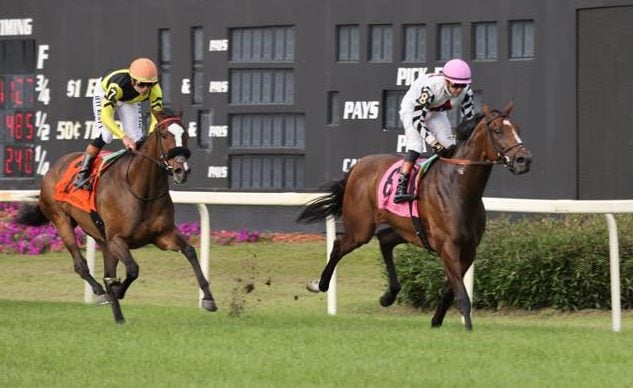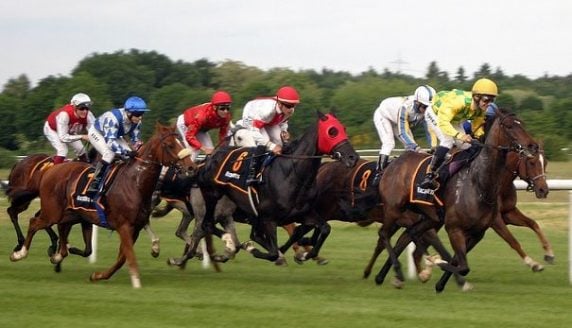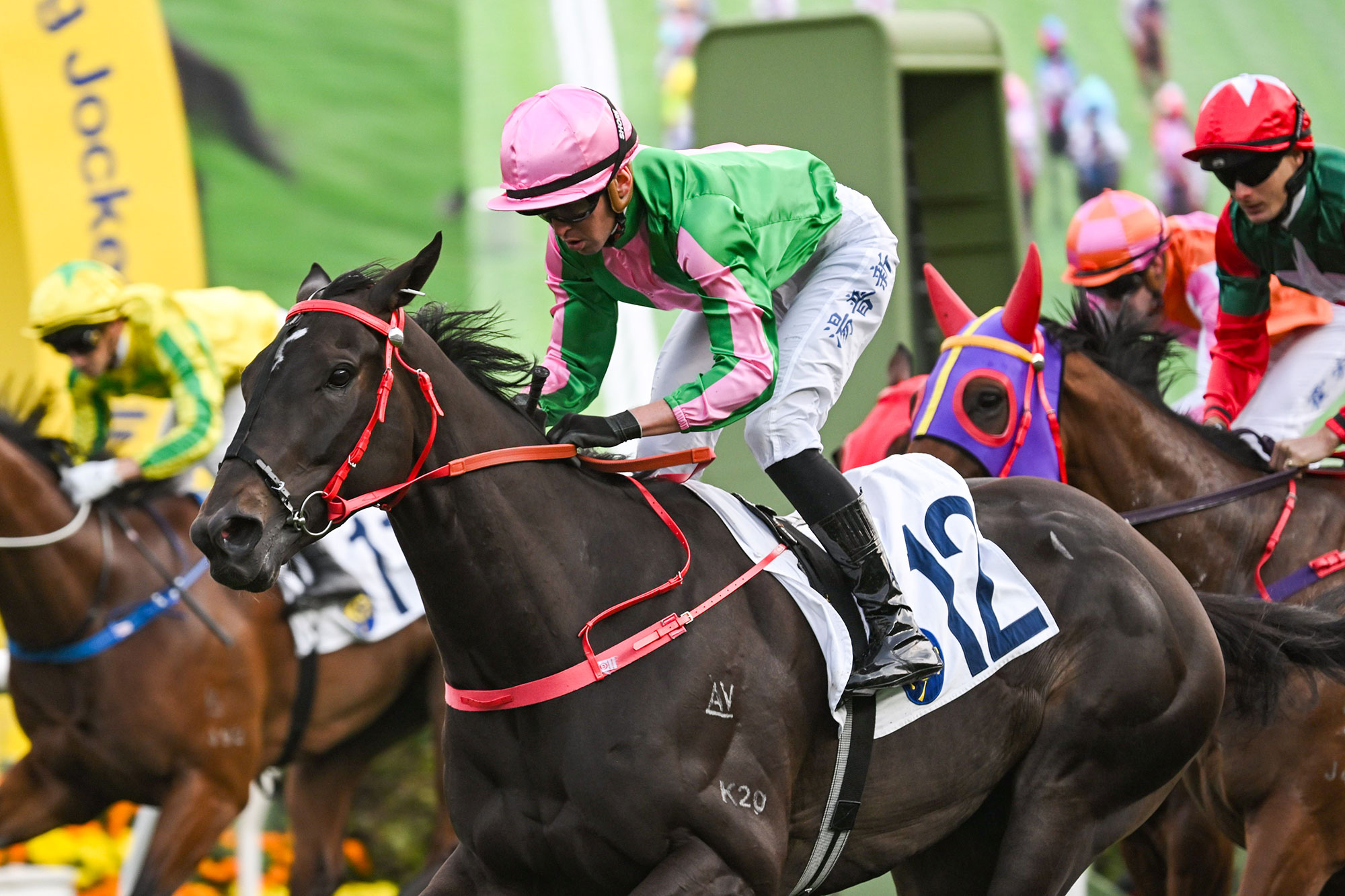January 31 – February 6
At the Cape Yearling Sale top prices are R92.000 for a colt (Complete Warrior – Well Matched) and R90.000 for a filly (Rampaging Native – Wainui). The sale average drops to R16.000 from R17.700 last year (10%).
Jockey Club Head Executive stewards meet with provincial MEC’s in charge of horse racing for the half-yearly progress report.
Natal trainer Herman Brown Jr is fined R10.000 and his horse Another Champ disqualified for testing positive in a race run at Clairwood in October 1992.
Cape trainer David Ferraris gets the same fine for the same reason, and his horse In The Light is disqualified after winning in November ’92.
Michael Roberts officially accepts an offer from Sheikh Mohammed to ride the Arab ruler’s horses in Europe.
Big-race trainer Darryl Hodgson strikes again when Heavyweight wins the Gr2 Merchants over 1200m at Kenilworth. Still stone-last at the 200m mark, Heavyweight steps on the accelerator to win going away by almost two lengths from Rock Candy and longtime race-leader Klaserie. Favourite Signor Amigo fails to find a place.
The post-racing Horses in Training sale at Kenilworth fails to come up to expectations, averaging just over R2000 for 22 lots. Top price of R18.000 is paid for racemare Top Shiner.
Another Arab-owned racehorse arrives in South Africa. Sprint/miler Rami (Riverman – Ancient Regime by Olden Times) joins the stable of Cape trainer Kannemeyer. The horse has an annual Timeform rating of 113.
A group of five men on horseback stop a motorist in Vryheid, demand money and rob the driver of a wristwatch. The headline in next day’s paper reads: “Men on horses rob woman”. Some would say that’s exactly what happens at South African racetracks week after week.
At the Cape mare sale 162 lots average just under R5.000, with a top price of R55.000 paid for the mare Rose Day (with Dancing Champ filly at foot and in foal again to that sire).
Eli’s Truth becomes the first since Bold Tropic to complete the Cape Guineas/Derby double. The son of Elliodor stallion Eli’s Star pips Vesta on the post in what appears to have been a false run race, with little pace early on. Court Messenger passed the post first, but as he’d dropped his jockey when leaving the stalls his performance didn’t count. Eli’s Truth and Vesta finish five lengths ahead of the third horse Milleverof.
February 7 – 13
Natal stallion Secret Prospector dies from the effects of laminitis. The son of Mr Prospector had made a great start to his stud career, with topclass runners Secret Rites, Secret Hoard and Gaelic Find from his first crop. He will leave a legacy of only six crops in South Africa.
South African champion jockey Jeff Lloyd rides winners of six of the ten races on the card at Clairwood.
Raceclubs in Natal embark on a rationalisation campaign to cut costs. Handicapping services will be centralised, and based at Summerveld, to be run by Greyville handicapper Colin Buckham and Scottsville’s George Kinnear.
Also to be streamlined is the production of racecards, currently in the hands of individual clubs in Natal.
Lyphard stallion Elliodor (sire of sires Model Man and Eli’s Truth) keeps making headlines. His son Lord Shirldor opens the Transvaal season in style by winning the Gr2 Dingaans (you’re right, that race used to be run in December) in a race run in pouring rain.
February 14 – 20
British Home Secretary Kenneth Clark indicates that the government expects Sunday racing to become legal within the next four years, along with Sunday betting. This is part of a package to legalise Sunday shopping in Britain, and it seems unlikely that parliament would veto the package once it is assembled.
Meanwhile, the Jockey Club announces that one more experimental Sunday meeting will take place in the second half of 1993. At least 17 tracks have expressed interest to stage the meeting. As the first two experiments were at Cheltenham and Doncaster, it is expected that a London track will be chosen. Ascot, Kempton Park or Lingfield seem the most likely venues.
Figures released in the USA show that while turnover figures remain similar due to increased simulcasting opportunities, on-course attendances show a record 5% drop.
A total of 77.713 races were held in the US last year on 8643 racedays. Average attendance was 6.480, while a total of $10.2 billion was wagered. Trainer Dale Baird had the most winners (256), D Wayne Lucas the highest stakes won ($9 million). Jockey Russel Blaze rode the most winners (433), Kent Desormeaux the highest stakes ($14 million).
The Cape Turf Club decides to put winter racing at the Durbanville track on ice. The country course usually hosts six midweek meetings during the wet months in July and August. The decision is taken for reasons of economics, as the Cape Turf Club is under heavy financial pressure. Maintenance of the track is cited as a considerable cost burden that has to be cut.
Rumours that the Durbanville track will be closed are not based on truth, says the Club.
Even better rumours circulate in Natal, where the “Arab connection” has been discovered. Speculation is that investors are interested in Aldora Stud, Highdown Stud and Summerhill, and the media are quick to discover a “freelance agent” who is involved in negotiations over the sale of a studfarm and will be “travelling overseas this week”. Not surprisingly, fears are expressed that Arab involvement in the South African racing industry could, as one writer puts it “lead to an unhealty domination which could prove the death knell for the smaller owners who form the backbone of many training establishments”. The writer conveniently overlooks the fact that the Arabs at least would have no problem paying their bills!
Although Summerhill’s Mick Goss fuels the fire by admitting to be aware of Arab interest, Aldora’s Guy Landon is straightforward. “There is no offer and no Arab. This is all the work of overheated imagination running wild”. When asked if he had any contact with Arab investors Landon retorted: “I haven’t seen an Arab since I spent a night in Cairo in 1975”.
Turffontein Racing Club announces the loss of a major sponsor. The OK Gold Bowl will no longer be sponsored by the company of that name. Rumours to this effect had already circulated on the day the last Gold Bowl (in October 1992) was run. The cancelled sponsorship is because a major shift in the company’s marketing emphasis, in which the OK Gold Bowl apparently has no place.
It was through a concerted effort of OK’s Gordon Hood and Turffontein’s John Alexander that the Gold Bowl rose from obscurity to take its place amongst South Africa’s best promoted Gr1 races.
Wolf Power filly Lupine Lady wins the Gr3 Henry Eatwell Memorial Sprint at Newmarket in new course record time (57.1s for the 1000m) by half a length from Fullfillment (who gives 2.5 kilos). Unfortunately the grey Lupine Lady chips her near-fore knee in the process and will be out of racing for a considerable period.
A group of Karoo breeders secures a new stallion, Philippi. A son of 2000 Guineas winner Zino who stands at stud in France, Philippi raced against Europe’s best in France, where he won the coveted Prix Robert Papin as a juvenile. The new sire will stand at David Southey’s Southford Stud in Colesberg.
Lady Firelli gives the Lipschitz/Lowe team another major winner when she wins the R100.000 Gr3 Gosforth Park Fillies & Mares Stakes over a mile. In a slow run race, marred by interference, the daughter of Elliodor puts in a strong finish to catch Please Be True, who with Michael Roberts in the saddle had made an early dash for it in the short straight.
February 21 – 27
Cape media react indignantly to the overturning of a penalty for excessive whipping, earlier imposed on jockey Doug Whyte. Cape writers Langerman (Cape Times) and Wilsnagh (Argus) both were witness to the incident where Whyte beat his horse senseless while at the tail-end of the field, which prompted the local Stipes to give the jockey a two week holiday (the horse pulled up lame after the race). An appeal board of three (anonymus) local executive stewards overturned both finding and penalty and let the jockey off “after hearing further evidence”. Everyone wonders what on earth the further evidence could be, but the Jockey Club stays mum – not surprisingly, perhaps.
Meanwhile in the Transvaal, Michael Roberts does not benefit from such divine intervention and gets suspended for a week for using his whip on the ear of his mount Classic Review on five occasions.
The Natal Tote introduces the Quartet bet, the 10-cent bet which has proved so successful in the Cape. The new bet is subject to the normal R4 minimum bet required in Natal (R4 gives the punter 40 bets). On a day of small fields and true-to-form results the quartet pay-outs are low and most do not exceed R100. Unfortunately to Tote computer fails to negotiate the quartet dividend for the very first race, and the TAB witholds all other quartet dividends as a precautionary measure until after the racemeeting. The cause of the problem is analysed as being the large number of cancelled bets from punters who felt their way along.
Owner-breeder Chris Saunders is elected to the Head Executive of the Jockey Club. The Natal industrialist succeeds Laurie Jaffee, who takes up an appointment on the Highveld Racing and Betting Board. Other Head Executive stewards are Ronnie Napier (chairman), Jack Ward, Alan Bell, Peter Fenix, Jules Horowitz, Ben Jonsson, Mike Joughin, Matthew McElligott, Gerald Rosenberg and Abe Swersky.
In the UK the Jockey Club battles with a spate of positive tests involving acetylpromazine, a fast acting tranquiliser, and the sedative detomidine. Police are investigating, fuelling speculation that the horses involved were “got at” by a gang that manipulates betting.
The Jockey Club offers a 5000 pound reward for information leading to conviction. A confidential hotline is opened for the purpose (“Raceguard”), and operates on a 24-hour basis.
Filly Blushing Star, a daughter of Our Casey’s Boy, is too quick for the boys when she makes almost all the running to win the R350.000 Gr1 Computaform Sprint at Gosforth Park. Heavily backed favourite Senor Santa pips Knife Edge for second.








